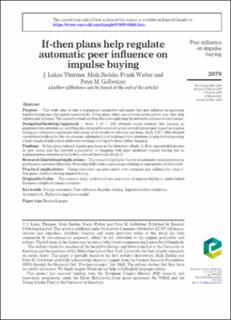Please use this identifier to cite or link to this item:
https://doi.org/10.21256/zhaw-20484| Publication type: | Article in scientific journal |
| Type of review: | Peer review (publication) |
| Title: | If-then plans help regulate automatic peer influence on impulse buying |
| Authors: | Thürmer, J. Lukas Bieleke, Maik Wieber, Frank Gollwitzer, Peter M. |
| et. al: | No |
| DOI: | 10.1108/EJM-05-2018-0341 10.21256/zhaw-20484 |
| Published in: | European Journal of Marketing |
| Volume(Issue): | 54 |
| Issue: | 9 |
| Page(s): | 2079 |
| Pages to: | 2105 |
| Issue Date: | 1-Jul-2020 |
| Publisher / Ed. Institution: | Emerald |
| ISSN: | 0309-0566 |
| Language: | English |
| Subjects: | Impulse buying; Peer influence; Implementation intention; Young consumer; Reflective-impulsive model |
| Subject (DDC): | 303: Social processes 658.8: Marketing management |
| Abstract: | This study aims to take a dual-process perspective and argues that peer influence on increasing impulse buying may also operate automatically. If-then plans, which can automate action control, may, thus, help regulate peer influence. This research extends existing literature explicating the deliberate influence of social norms. Study 1 (N = 120) obtained causal evidence that forming an implementation intention (i.e. an if-then plan designed to automate action control) reduces peer impact on impulse buying in a laboratory experiment with young adults (students) selecting food items. Study 2 (N = 686) obtained correlational evidence for the role of norms, automaticity and implementation intentions in impulse buying using a large sample of high-school adolescents working on a vignette about clothes-shopping. If-then plans reduced impulse purchases in the laboratory (Study 1). Both reported deliberation on peer norms and the reported automaticity of shopping with peers predicted impulse buying but an implementation intention to be thriftily reduced these links (Study 2). This research highlights the role of automatic social processes in problematic consumer behaviour. Promising field studies and neuropsychological experiments are discussed. Young consumers can gain control over automatic peer influence by using if-then plans, thereby reducing impulse buying. This research helps understand new precursors of impulse buying in understudied European samples of young consumers. |
| URI: | https://digitalcollection.zhaw.ch/handle/11475/20484 |
| Fulltext version: | Published version |
| License (according to publishing contract): | CC BY 4.0: Attribution 4.0 International |
| Departement: | School of Health Sciences |
| Organisational Unit: | Institute of Public Health (IPH) |
| Appears in collections: | Publikationen Gesundheit |
Files in This Item:
| File | Description | Size | Format | |
|---|---|---|---|---|
| 2020_Thuermer-etal_if-then-plans.pdf | 465.88 kB | Adobe PDF |  View/Open |
Show full item record
Thürmer, J. L., Bieleke, M., Wieber, F., & Gollwitzer, P. M. (2020). If-then plans help regulate automatic peer influence on impulse buying. European Journal of Marketing, 54(9), 2079–2105. https://doi.org/10.1108/EJM-05-2018-0341
Thürmer, J.L. et al. (2020) ‘If-then plans help regulate automatic peer influence on impulse buying’, European Journal of Marketing, 54(9), pp. 2079–2105. Available at: https://doi.org/10.1108/EJM-05-2018-0341.
J. L. Thürmer, M. Bieleke, F. Wieber, and P. M. Gollwitzer, “If-then plans help regulate automatic peer influence on impulse buying,” European Journal of Marketing, vol. 54, no. 9, pp. 2079–2105, Jul. 2020, doi: 10.1108/EJM-05-2018-0341.
THÜRMER, J. Lukas, Maik BIELEKE, Frank WIEBER und Peter M. GOLLWITZER, 2020. If-then plans help regulate automatic peer influence on impulse buying. European Journal of Marketing. 1 Juli 2020. Bd. 54, Nr. 9, S. 2079–2105. DOI 10.1108/EJM-05-2018-0341
Thürmer, J. Lukas, Maik Bieleke, Frank Wieber, and Peter M. Gollwitzer. 2020. “If-Then Plans Help Regulate Automatic Peer Influence on Impulse Buying.” European Journal of Marketing 54 (9): 2079–2105. https://doi.org/10.1108/EJM-05-2018-0341.
Thürmer, J. Lukas, et al. “If-Then Plans Help Regulate Automatic Peer Influence on Impulse Buying.” European Journal of Marketing, vol. 54, no. 9, July 2020, pp. 2079–105, https://doi.org/10.1108/EJM-05-2018-0341.
Items in DSpace are protected by copyright, with all rights reserved, unless otherwise indicated.